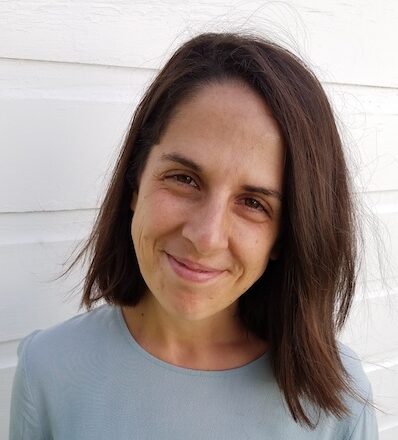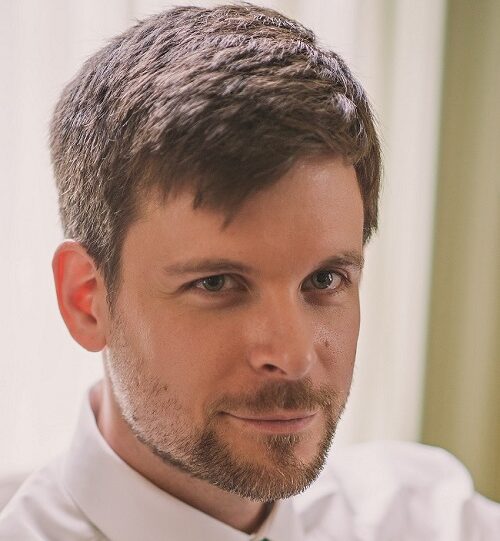Research Team
- Brieanne Berry
- Travis Blackmer
- Jared Entwistle
- Michael Haedicke
- Cynthia Isenhour
- Susanne Lee
- Jean MacRae
- Deborah Saber
- Linda Silka
- Erin Victor

Brieanne Berry, Ph.D.
Postdoctoral researcher, UMaine Department of Anthropology
Why is Materials Management important to you?
The challenge of sustainably managing materials throughout their lifecycle is enormous. The work of our research team is critical because sustainable materials management crosses over disciplinary lines, and involves understanding diverse perspectives. Our interdisciplinary work to bring stakeholders, students, and policymakers into the research process is what makes this research team so important.
Produced and/or Pending works:
- Berry, B., C. Isenhour, J. MacRae, E. Victor, T. Blackmer, J. Entwistle, L. Silka, M. Haeddicke, S. Lee, D. Saber. After the Perfect Storm: Resilience Planning in Maine’s Waste Management System Case Studies in the Environment Vol. 6 (1): 1706963,July 4, 2022, pps. 1–11. electronic ISSN 2473-9510
- Sharing Isn’t Easy: Food Waste and Food Redistribution in Maine K–12 Schools
- Rummaging through the Attic of New England.
- Linking Rural and Urban Circular Economies through Reuse and Repair
- On Qualitative Writing: Building an Interdisciplinary Community of Practice
- Circular Food Systems in Maine: Findings from an Interdisciplinary Study of Food Waste Management
- ‘Still Good Life’: On the Value of Reuse and Distributive Labor in ‘Depleted’ Rural Maine
- Maine’s Culture of Reuse and Its Potential to Advance Environmental and Economic Policy Objectives
For more information about Brie’s work click here

Travis Blackmer, M.A.
Lecturer and undergraduate coordinator, UMaine School of Economics; Mitchell Center Faculty Fellow
Why is Materials Management Important to you?
Travis got his first exposure to materials management through a summer research project as an undergraduate student where he led a team that sorted 20,000lbs of garbage for the Maine State Planning Office. This experience was eye opening (and nostril de-sensitizing) and has become a driving force for his interest in working with stakeholders to look at materials of all kinds that are no longer wanted by the end user. The idea that everything has a VALUE, even if that value is negative, is an important facet of improving our materials management. Composting and the circular food system has become a primary focus. Travis has a passion for projects that connect communities to food waste diversion options locally, with initiatives recently in Midcoast and Kennebec Valley.
Produced and/or Pending works:
- Impacts of Pay-As-You-Throw and Other Residential Solid Waste Policy Options: Southern Maine 2007–2013
- MSW Maine: A 2011 residential waste characterization study for the state of Maine
- Maine Residential Waste Characterization Study

Jared Entwistle
UMaine master’s student, Ecology and Environmental Sciences and Business Administration
Why is Materials Management Important to you?
As I pursue a dual degree in MBA and MS in Ecology and Environmental Sciences, I am increasingly concerned with the amount of waste our society creates, both as an issue of lost economic efficiency and the physical refuse we create and discard. The research the Materials Management team produces helps clarify issues in our current waste stream and provides insight on possible solutions, which are important steps toward creating an economy that is sustainable for our environmental and societal health.

Michael Haedicke, Ph.D.
Associate Professor, UMaine Department of Sociology; Mitchell Center Faculty Fellow
Why is Materials Management important to you?
As an environmental sociologist with a research focus on food and agricultural systems, I am particularly interested in developments related to the management and reduction of food waste. The systemic approach of the materials management team fits very well with the perspectives that I use in my research and teaching.
Published and/or Pending works:
- Building Nature’s Market: The Business and Politics of Natural Foods
- Microsociological Perspectives for Environmental Sociology
- Sustainability: Approaches to Environmental Justice and Social Power
- For a complete list of Michael’s published works, click here

Cynthia Isenhour, Ph.D.
Associate Professor, UMaine Department of Anthropology; Mitchell Center Faculty Fellow
Why is Materials Management important to you?
Cindy Isenhour joined the Materials Management Research Group in 2015. With expertise linked to cross-cultural environmental governance and sustainability movements Isenhour has since enjoyed learning more about the end of production-consumption-disposal systems and the opportunity to research culturally appropriate and just policies to reduce waste and materials use. In addition to the MMRG’s collaborative research projects, Isenhour is also working on research projects focused on Maine’s second hand economy and Circular Economy policy and practice in the United States.
Produced and/or Pending works:
- Distributive Labor in “Depleted” Rural Maine
- Linking Rural and Urban Circular Economies through Reuse and Repair.
- Waste Materiality and Meaning: Ethnographic Engagements with Reuse, Repair and Care
- Power and Politics in Sustainable Consumption Research
- Rummaging Through the Attic of New England

Susanne Lee, M.B.A.
Mitchell Center Faculty Fellow
Why is Materials Management important to you?
It is really a privilege to be part of the Mitchell Center’s Materials Management team. I love working with such a talented and diverse interdisciplinary team to research and develop sustainable materials management solutions. In the end, our work can save money and build economic opportunities for Maine, improve the quality of life in Maine communities, and protect Maine’s amazing natural resources.
Produced and/or Pending works:
For more information on Susanne’s work, click here

Jean MacRae, Ph.D.
Associate Professor, UMaine Department of Civil and Environmental Engineering; Mitchell Center Faculty Fellow
Why is Materials Management important to you?
I think we need to move a more sustainable system where we are more efficient in our use of materials (and energy and water) so we can leave more habitat undisturbed. To me, that means finding ways to recover everything that is reusable, and put the remainder to its best alternative purpose – including recovering energy, fertilizer and soil amendments from food scraps, and recovering value from other waste streams.
Produced and/or Pending works:
- Thakali, A., J.D. MacRae, C. Isenhour, T. Blackmer. 2022. Composition and Contamination of Source Separated Food Waste from Different Sources and Regulatory Environments. Journal of Environmental Management Vol 314, July 2022
- Thakali, A., J.D. MacRae. Review of Chemical and Microbial Contamination in Food: What are the Threats to a Circular Food System? Environmental Research 194 (2021) 110635
- Anaerobic Digestion: A Sustainable Alternative for Food Waste Management in Maine. UMaine Student Symposium, April 10, 2019
- Using GIS to find optimal locations for food waste digestion and/or composting operations in Maine
- Uptake of mercury by thiol-grafted chitosan gel beads.
- Sorption of Cadmium by Chitosan-based Crab Shells.

Deborah Saber, Ph.D.
Associate Professor, UMaine School of Nursing; Mitchell Center Faculty Fellow
Why is Materials Management important to you?
In June of 2016, I joined the Mitchell Center Materials Management Research Group to focus on the role of healthcare on environmental sustainability within an interdisciplinary team. My research interests broadened to include the role of healthcare within food system sustainability. Our work is critically important as we continue to work towards comprehensive solutions to support environmental sustainability.
Produced and/or Pending works:
- Healthcare’s Role in Environmental Sustainability: Nurses Are Needed to Guide Efforts!
- Tackling wicked problems through undergraduate interdisciplinary teams: A team perspective.
- Sustainable consumption: The need for interdisciplinary approaches if the waste problem is to be understood and addressed
- Towards a psychology of the food-energy-water nexus: Costs and opportunities.
- Evaluation horizontal violence and bullying in the nursing workforce of an oncology academic medical center.
- Solid waste and disposal processes for isolated patients with infectious disease.
- Disposal of medical wastes from infectious hospitalized patients: A mandate for re-examining current practices
- An Interprofessional Approach to Continuing Education with Mass Casualty Simulation: Planning and Execution
- Interprofessional mass casualty incident simulation design protocol to prepare prelicensure nursing students to respond to a disaster

Linda Silka, Ph.D.
Mitchell Center Senior Fellow
Why is Materials Management important to you?
I first became interested in materials management issues when I directed the Center for Family, Work, and Community at UMass Lowell and we were contacted by the city of Lowell and asked to “educate” the growing immigrant and refugee residents who were not recycling. We took this as an opportunity to learn and not to tell others what to do. We set up all sorts of sharing events (we called them “Talking Trash”) to learn from each other about how to recycle and what to recycle. We built recycling themes into “English as a Second Language” as another way for learning to occur. We all learned so much and changed many practices in the city to ensure that recycling was responsive to all of the needs, wants, and skills of community members. It has been exciting to continue this work in Maine.
Produced and/or Pending Works:
- Food Waste as a Classic Problem that Calls for Interdisciplinary Solutions: A Case Study Illustration.
- Silos” in the Democratization of Science.
- Becoming Part of the Solution: Engaged Research on Sustainability. Chapter 9 of University Engagement and Environmental Sustainability.
- Combining history and culture to reach environmental goals. New Village: Building Sustainable Cultures,

Erin Victor
Doctoral Student, UMaine Anthropology & Environmental Policy
Why is Materials Management important to you?
It wasn’t until college that I had access to recycling and started considering my own “waste footprint.” Joining the recycling crew and supporting the reuse center was my first purview into the “world of waste” or material management and I haven’t looked back ever since. Prior to starting my doctoral studies at the University of Maine, I worked in local and state government on sustainability and waste management initiatives with a specific focus on waste prevention and reduction. As a doctoral student in the Anthropology and Environmental Policy program, my research explores policy solutions to the “plastic crisis,” specifically focusing on Extended Producer Responsibility (EPR) programs for packaging in Canada and the United States. The interdisciplinary material management team provides an important systems-wide perspective, working with stakeholders from across Maine and opening up new solutions to the complex material management challenges we face today. For more about Erin and a list of her work, click here.
